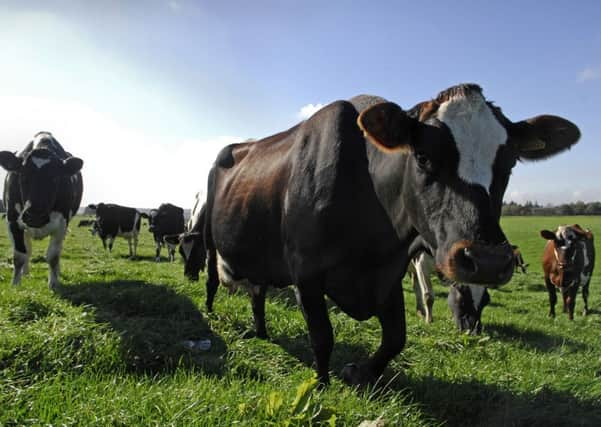Support needed for dairy farmers


Defra this week pledged a one-off allocation of £15.5m in support to the UK’s milk producers but the National Farmers Union has said that, while the EU-funded cash is a welcome boost, more action needs to be taken in order to make a long term difference to many British dairy farmers who are struggling to keep their businesses afloat.
The union has spent much the of the summer lobbying in Brussels and Westminster for extra support. The Yorkshire Post has reported in recent months how the dairy herd of Yorkshire has more than halved since the turn of the century as the industry goes through a rapid period of consolidation.
Advertisement
Hide AdAdvertisement
Hide AdNFU President Meurig Raymond said: “The allocation of EU funds to English and Welsh dairy farmers will provide a welcome cash boost for thousands of those are experiencing devastating price cuts and market volatility.
“It is important now that this money is distributed on time and without the burden of unnecessary red tape. We urge the Rural Payments Agency to ensure that all eligible farmers are paid by the end of December, as promised by the Secretary of State.
“We continue to press ministers to recognise that all sectors are suffering cash flow problems. We urge Defra ministers to take up options to release funds such as agri-environment part payment and BPS as soon as possible.”
NFU dairy board chairman Rob Harrison said: “AHDB figures show that average UK milk prices have fallen by 25 percent in the last year, but that hides the variance that we currently see in the sector. Some First Milk farmers have seen their milk price halve in the same period – from 30.52ppl in July 2014 down to around 15-16ppl this July - so thousands of British dairy farmers will welcome this cash boost.
Advertisement
Hide AdAdvertisement
Hide Ad“However, we must keep this in context. Although it is encouraging to see the EU Commission and British government recognise the extent of the dairy crisis, British dairy farmers, on average, were £10,000 worse off in July this year compared to the same time 12 months ago. How much difference will the average payment of £1,800 make?
“The allocation of the EU farming support package is far from the end of the story. We will continue to urge government, processors and retailers to work with farmers for more fair and transparent contracts, stronger producer groups and the development of a futures market.
“In addition, dairy products must be more clearly labelled as British and the EU must commit to a technical review of the dairy intervention scheme.”
Defra has previously said that it was pursuing a host of measures to improve the long-term stability of the dairy industry, including working with the food industry on more consistent labelling and branding of British dairy products and improving transparency across the supply chain.
Advertisement
Hide AdAdvertisement
Hide AdAn industry-led review of best practice in the dairy supply chain is underway and government has committed to publishing details of its own catering contracts, including their renewal dates, to bring transparency to the market and allow dairy farmers the opportunity to prepare and compete for contracts.
According to a recent survey by RABDF, almost half of Britain’s dairy farmers are scheduled to leave the sector and 45 per cent of the remaining half who intend to continue in production have pit their expansion plans on hold.